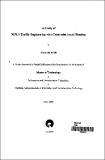Please use this identifier to cite or link to this item:
http://drsr.daiict.ac.in//handle/123456789/68| Title: | Study of MPLS traffic engineering with constraint-based routing |
| Authors: | Maitra, Anutosh Modi, Bhavesh |
| Keywords: | Data transmission MPLS Architecture Multiplexing Packet switching Routing |
| Issue Date: | 2004 |
| Publisher: | Dhirubhai Ambani Institute of Information and Communication Technology |
| Citation: | Modi, Bhavesh (2004). Study of MPLS traffic engineering with constraint-based routing. Dhirubhai Ambani Institute of Information and Communication Technology, viii, 50 p. (Acc.No: T00031) |
| Abstract: | Multi-protocol Label Switching (MPLS) is fast becoming popular for future communication networks running applications demanding high speed and Quality of Service. In this work, we have studied the evolution of MPLS, various issues related to MPLS and the architecture ofMPLS. The simplicity and functional capabilities ofMPLS enables various important applications over it such as Virtual Private Networks, Provisioning of Quality of Service and Traffic Engineering. The traffic engineering perspective of MPLS is studied in a greater detail as MPLS protocol has certain advantageous features in traffic engineering applications, the major being that it allows explicit routing, through which separately calculated routes can be specified for different traffic flows. The process of route calculation can be automated with the help of Constraint-based Routing. The thesis also presents a study on Constraint-based routing in MPLS environment. After that, a few classical constraint-based routing algorithms that consider bandwidth as constraint are investigated. The effectiveness of these algorithms is ascertained by means of simulation results. The concept of minimum interference routing and the corresponding algorithm MIRA is studied in greater detail in this work and presented in the thesis. The performance of MIRA was analyzed and factors that affect the performance were identified. Finally, the work suggests two modifications over MIRA based on the observations and analysis mentioned above. The primary philosophy behind the modifications are identifying the criticality of the resources and quantifying the order of the criticality. The performance of the suggested modified algorithms is benchmarked against classical MIRA algorithm and the simulation results are presented. |
| URI: | http://drsr.daiict.ac.in/handle/123456789/68 |
| Appears in Collections: | M Tech Dissertations |
Files in This Item:
| File | Description | Size | Format | |
|---|---|---|---|---|
| 200211041.pdf Restricted Access | 2.15 MB | Adobe PDF |  View/Open Request a copy |
Items in DSpace are protected by copyright, with all rights reserved, unless otherwise indicated.
